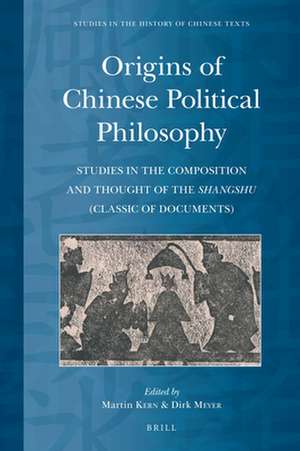Origins of Chinese Political Philosophy: Studies in the Composition and Thought of the <i>Shangshu</i> (Classic of Documents): Studies in the History of Chinese Texts, cartea 8
Martin Kern, Dirk Meyeren Limba Engleză Hardback – 24 mai 2017
Contributors are: Joachim Gentz, Yegor Grebnev, Magnus Ribbing Gren, Michael Hunter, Martin Kern, Maria Khayutina, Robin McNeal, Dirk Meyer, Yuri Pines, Charles Sanft, David Schaberg, Kai Vogelsang.
Preț: 716.06 lei
Preț vechi: 873.24 lei
-18% Nou
Puncte Express: 1074
Preț estimativ în valută:
137.01€ • 143.44$ • 113.37£
137.01€ • 143.44$ • 113.37£
Carte indisponibilă temporar
Doresc să fiu notificat când acest titlu va fi disponibil:
Se trimite...
Preluare comenzi: 021 569.72.76
Specificații
ISBN-13: 9789004343498
ISBN-10: 9004343490
Pagini: 508
Dimensiuni: 155 x 235 x 32 mm
Greutate: 0.86 kg
Editura: Brill
Colecția Brill
Seria Studies in the History of Chinese Texts
ISBN-10: 9004343490
Pagini: 508
Dimensiuni: 155 x 235 x 32 mm
Greutate: 0.86 kg
Editura: Brill
Colecția Brill
Seria Studies in the History of Chinese Texts
Notă biografică
Martin Kern, Ph.D. (1996) is Professor of East Asian Studies at Princeton University. His publications include The Stele Inscriptions of Ch’in Shih-huang: Text and Ritual in Early Chinese Imperial Representation (American Oriental Society, 2000) and Text and Ritual in Early China (ed., Univ. of Washington Press, 2005).
Dirk Meyer, PhD. (2008) is Associate Professor of Chinese Philosophy, and Fellow of The Queen’s College, University of Oxford. He publishes on meaning production and the history of thought. His monograph, Philosophy on Bamboo, appeared with Brill in 2012.
Dirk Meyer, PhD. (2008) is Associate Professor of Chinese Philosophy, and Fellow of The Queen’s College, University of Oxford. He publishes on meaning production and the history of thought. His monograph, Philosophy on Bamboo, appeared with Brill in 2012.
Cuprins
Introduction - Martin Kern and Dirk Meyer
1 Language and the Ideology of Kingship in the “Canon of Yao” - Martin Kern
2 Competing Voices in the Shangshu - Kai Vogelsang
3 Recontextualization and Memory Production: Debates on Rulership as Reconstructed from “Gu ming” 顧命 - Dirk Meyer
4 One Heaven, One History, One People: Repositioning the Zhou in Royal Addresses to Subdued Enemies in the “Duo shi” 多士 and “Duo fang” 多方 Chapters of the Shangshu and in the “Shang shi” 商誓 Chapter of the Yi Zhoushu - Joachim Gentz
5 The Qinghua “Jinteng” 金縢 Manuscript: What It Does Not Tell Us about the Duke of Zhou - Magnus Ribbing Gren
6 “Shu” Traditions and Text Recomposition: A Reevaluation of “Jinteng” 金縢 and “Zhou Wu Wang you ji” 周武王有疾 - Dirk Meyer
7 The Yi Zhoushu and the Shangshu: The Case of Texts with Speeches - Yegor Grebnev
8 The “Harangues” (Shi 誓) in the Shangshu - Martin Kern
9 Speaking of Documents: Shu Citations in Warring States Texts - David Schaberg
10 A Toiling Monarch? The “Wu yi” 無逸 Chapter Revisited - Yuri Pines
11 Against (Uninformed) Idleness: Situating the Didacticism of “Wu yi” 無逸 - Michael Hunter
12 “Bi shi” 粊誓, Western Zhou Oath Texts, and the Legal Culture of Early China - Maria Khayutina
13 Concepts of Law in the Shangshu - Charles Sanft
14 Spatial Models of the State in Early Chinese Texts: Tribute Networks and the Articulation of Power and Authority in Shangshu “Yu gong”
禹貢 and Yi Zhoushu “Wang hui” 王會 - Robin McNeal
Index
1 Language and the Ideology of Kingship in the “Canon of Yao” - Martin Kern
2 Competing Voices in the Shangshu - Kai Vogelsang
3 Recontextualization and Memory Production: Debates on Rulership as Reconstructed from “Gu ming” 顧命 - Dirk Meyer
4 One Heaven, One History, One People: Repositioning the Zhou in Royal Addresses to Subdued Enemies in the “Duo shi” 多士 and “Duo fang” 多方 Chapters of the Shangshu and in the “Shang shi” 商誓 Chapter of the Yi Zhoushu - Joachim Gentz
5 The Qinghua “Jinteng” 金縢 Manuscript: What It Does Not Tell Us about the Duke of Zhou - Magnus Ribbing Gren
6 “Shu” Traditions and Text Recomposition: A Reevaluation of “Jinteng” 金縢 and “Zhou Wu Wang you ji” 周武王有疾 - Dirk Meyer
7 The Yi Zhoushu and the Shangshu: The Case of Texts with Speeches - Yegor Grebnev
8 The “Harangues” (Shi 誓) in the Shangshu - Martin Kern
9 Speaking of Documents: Shu Citations in Warring States Texts - David Schaberg
10 A Toiling Monarch? The “Wu yi” 無逸 Chapter Revisited - Yuri Pines
11 Against (Uninformed) Idleness: Situating the Didacticism of “Wu yi” 無逸 - Michael Hunter
12 “Bi shi” 粊誓, Western Zhou Oath Texts, and the Legal Culture of Early China - Maria Khayutina
13 Concepts of Law in the Shangshu - Charles Sanft
14 Spatial Models of the State in Early Chinese Texts: Tribute Networks and the Articulation of Power and Authority in Shangshu “Yu gong”
禹貢 and Yi Zhoushu “Wang hui” 王會 - Robin McNeal
Index














